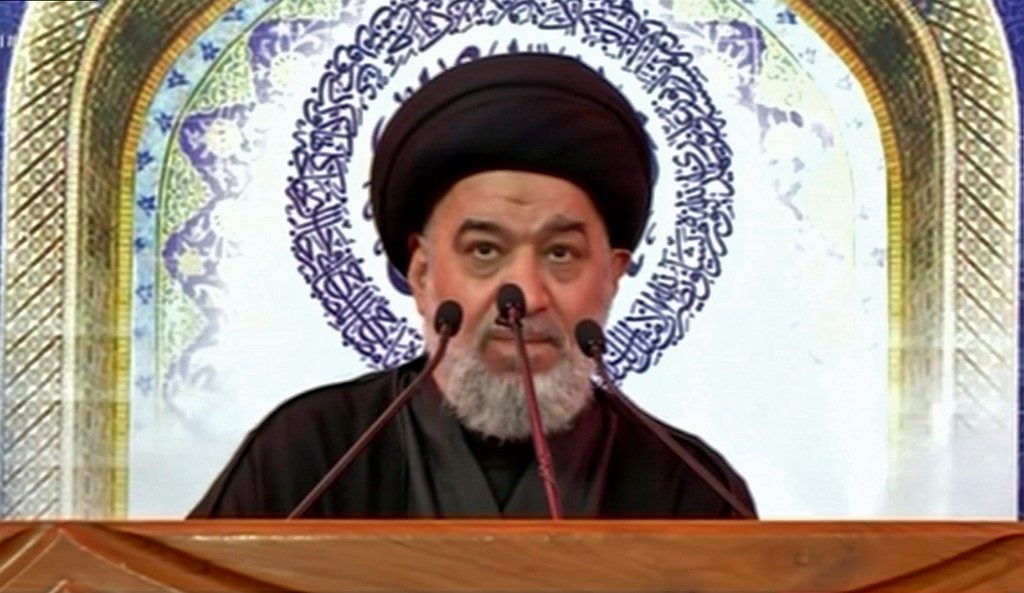SUMMARY
This is AI generated summarization, which may have errors. For context, always refer to the full article.

BAGHDAD, Iraq (UPDATED) – Clashes intensified Friday, October 4, in Baghdad between protesters and police as Iraq’s Shiite spiritual leader urged authorities to heed the demands of demonstrators who have rallied in the capital and other cities for 4 straight days.
The endorsement from Grand Ayatollah Ali Sistani, who is revered among Iraq’s Shiite majority, prompted celebratory gunfire from protesters and piled new pressure on Prime Minister Adel Abdel Mahdi as he battles to quell the intensifying unrest that has left dozens dead.
Many had been waiting for a signal from Sistani in his Friday prayer sermon, read out by representatives in Shiite holy places across Iraq, before deciding whether to join protesters in defying the daytime curfew in force in Baghdad and other cities.
The premier has appealed for patience from the young unemployed who have formed the mainstay of the protests, saying his not yet year-old government needs more time to implement reforms.
Sistani retorted that the government needed to take “clear and practical steps” and act now “before it’s too late” to address popular grievances.
Otherwise, he warned, the protests would intensify and demonstrators will “simply come back even stronger.”
The government “must do what it can to improve public services, find work for the unemployed, end clientelism, deal with the corruption issue and send those implicated in it to prison,” Sistani said, listing some of the grievances.
But despite his appeal, a curfew and an internet blackout, Iraqis thronged the iconic Tahrir Square on Friday, clashing with police, Agence France-Presse reporters said.
Police opened up with a barrage of gunfire and reporters said they saw several people hit by bullets, some in the head and the stomach.
“We will continue the movement. We heard Adel Abdel Mahdi, his speech was disappointing and we reject it totally,” said protester Adel Abdel Hadi, who had come to Baghdad from the southern city of Basra.
Samer, another protester, said he was “not impressed” even by Sistani’s comments.
“I had hoped for more. The religious establishment should be a source of support, with one word they could have brought the government down. I see the speeches of Mahdi and Sistani as the same,” he said.
After Sistani’s sermon, parliament announced that it would dedicate the session on Saturday, October 5, “to examining the demands of the protesters.”
‘Reject and condemn’
Protests first broke out in Baghdad on Tuesday, October 1, and have since spread across the Shiite-dominated south.
They are unusual because of their apparent spontaneity and independence in a country where rallies are typically called by politicians or religious figures.
At least 37 people have been killed, including 4 police, with hundreds wounded in 4 days, medical and security sources said.
Sistani voiced dismay at the mounting death toll.
“There are attacks on peaceful protesters and security forces which we reject and condemn,” he said.
Sistani’s message is a huge blow to Abdel Mahdi’s government. The top cleric has repeatedly acted as final arbiter of the politics of Iraq’s Shiite community, which dominates the government.
In his first public address since Tuesday, Adel Mahdi had asked for more time to implement his reform agenda in a country plagued by corruption and unemployment after decades of conflict.
“There are no magic solutions,” he said.
‘Lethal force’
Riot police have unleashed water cannons, tear gas, rubber bullets and live fire to clear the streets of protesters, who amassed despite curfews and an internet blackout across three-quarters of Iraq since Wednesday, October 2.
On Friday, Abdel Mahdi gave his full support to the security forces, insisting they were abiding by “international standards” in dealing with protesters.
He described the clashes as “the destruction of the state, the entire state,” but refrained from directly addressing protesters’ demands.
As protests and clashes gained in intensity, many Baghdad shops and petrol stations remained shuttered Friday.
In a residential area near the protest site, crowds gathered to buy vegetables and fruit, with one shopkeeper saying the price of tomatoes, grapes and other greens had risen threefold.
Northern and western provinces that were ravaged in the 2014-2017 war against the Islamist State group have remained relatively quiet.
The tensions prompted authorities in neighboring Iran to call on citizens planning to take part in a major Shiite pilgrimage in Iraq this month to delay their travel “until conditions ease.”
The United Nations and Amnesty International urged Iraqi authorities to respect the right of peaceful assembly.
“We are worried by reports that security forces have used live ammunition and rubber bullets in some areas, and have also fired tear gas canisters directly at protesters,” Marta Hurtado, spokeswoman for the UN human rights office, told reporters in Geneva.
Amnesty International’s Middle East research director Lynn Maalouf condemned the use of “lethal and unnecessary force.”
An internet blackout was a “draconian measure…to silence protests away from cameras and the world’s eyes,” she added. – Rappler.com
Add a comment
How does this make you feel?
There are no comments yet. Add your comment to start the conversation.